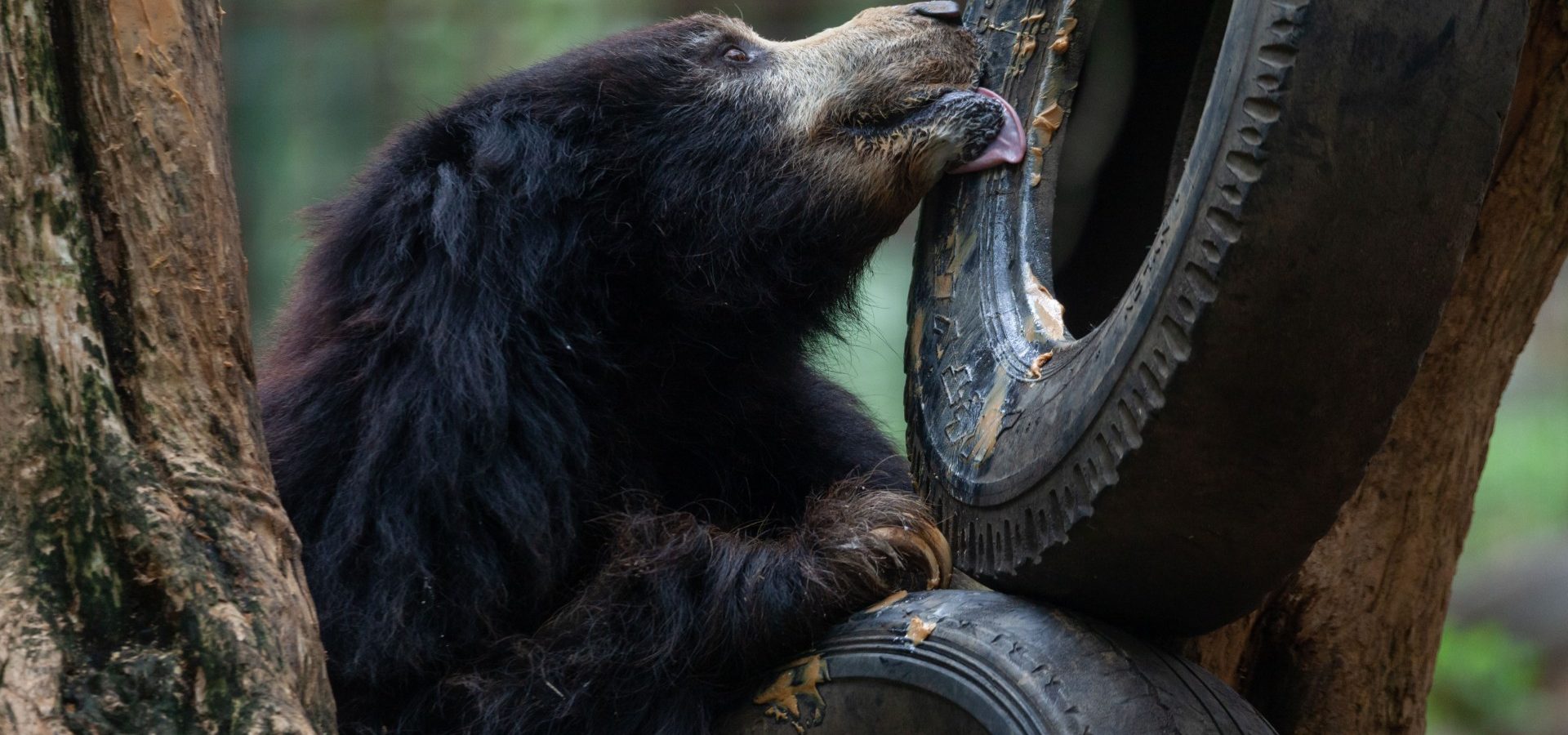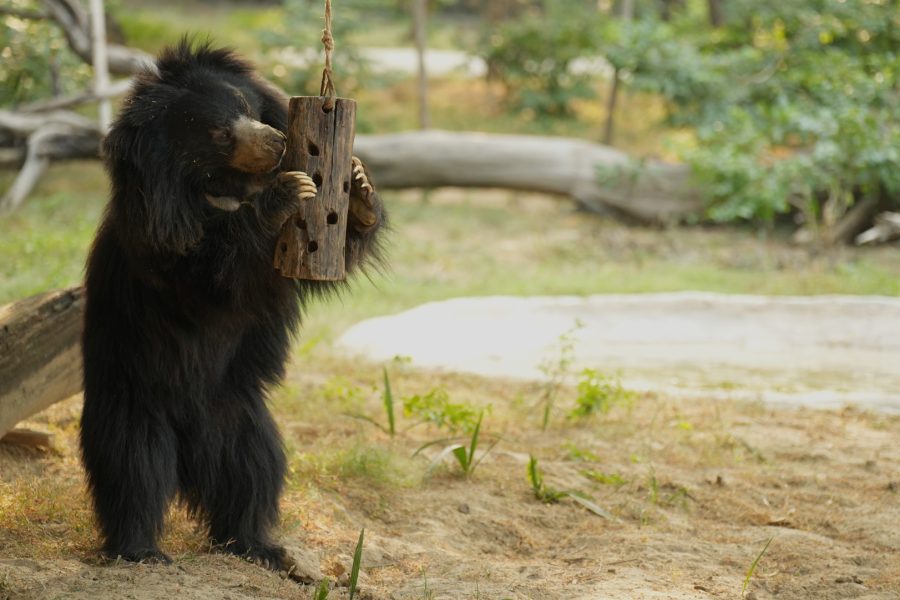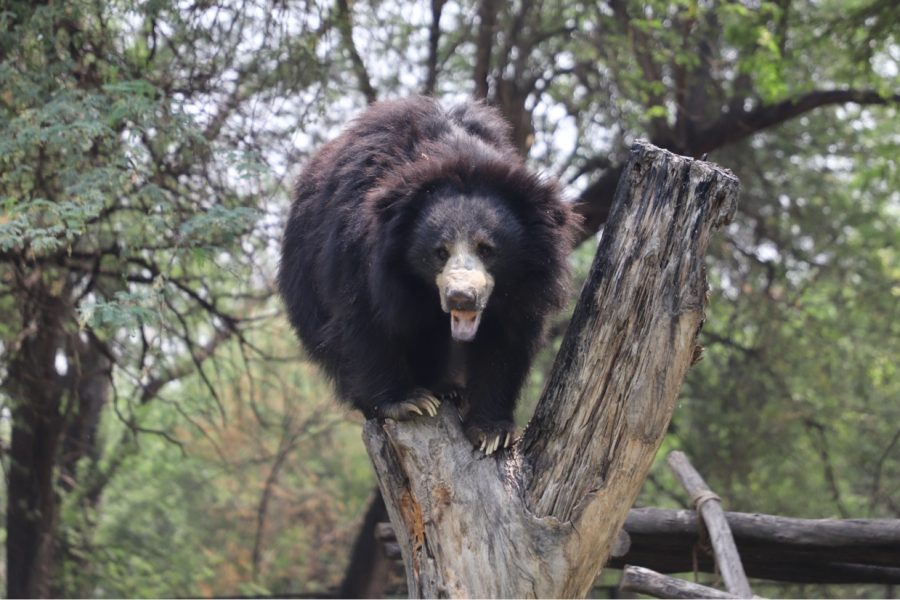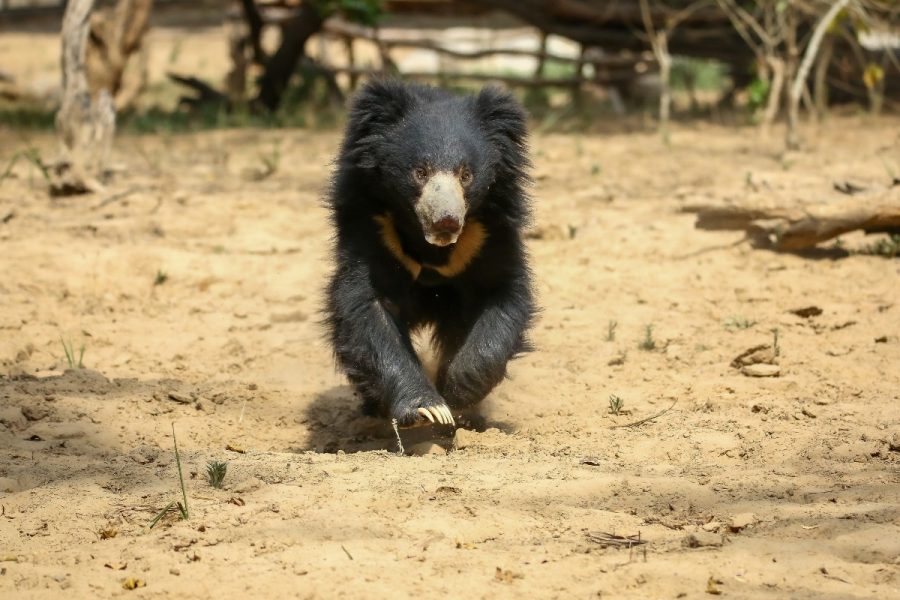Arthritis is a fairly common and well-known medical condition in humans — where one experiences inflammation in the joints. However, if you thought arthritis was only a problem in humans, you might need to think again. Research published by Wildlife SOS revealed that the condition is also prevalent amongst ‘dancing’ Sloth bears.
Poached at a young age from the wild, separated from their family, some Sloth bears are subjected to a series of harsh processes. In order to make them ‘fit’ for the ‘dancing’ bear practice, the cubs’ teeth are smashed and their muzzles are poked with a hot, metal rod. Next, a thick coarse rope is threaded through the fresh wound, which makes it easy to govern their every move. Years of abuse and sheer neglect leaves ‘dancing’ bears with a myriad of health problems coupled with severe psychological issues.
The health issues may be expressed in various forms — from wounds and injuries to discomfort and pain. One of the most common conditions that these former ‘dancing’ bears suffer from is arthritis in the hip joint.
To provide animals with adequate welfare, the Five Freedoms are globally recognised as the gold standard: freedom from hunger and thirst; freedom from discomfort; freedom from pain, injury, and disease; freedom to express normal and natural behaviour; and freedom from fear and distress. However, ‘dancing’ bears were deprived of these basic freedoms, thus compromising their mental and physical severely. Over the years, the dedicated staff at Wildlife SOS have been working to ensure that these requirements are fulfilled while providing longterm medical care to our rescue bears.
Sundari’s Journey
In 2005, Wildlife SOS along with the Karnataka Forest Department found a Sloth bear, who had been forced into the ‘dancing’ bear practice. The 12-year-old female had endured agonising pain due to the rope that was pushed through her delicate muzzle. While the owner tugged and pulled the rope, she was made to ‘dance’ for entertainment on the streets of India.
Sundari, rightly named after the Hindi word that translates to ‘beautiful’, is now living at the Bannerghatta Bear Rescue Centre (BBRC). While her life took a positive turn 17 years ago, she was left with indelible physical and psychological scars. Her face was left mutilated due to the piercing of the muzzle with a hot iron rod. Our team of dedicated veterinarians and caregivers have left no stone unturned in providing a much nourishing life that Sundari truly deserves. With continuous care, timely meals, engaging enrichments, and the company of other bears, this geriatric bear is thriving at BBRC.
However, medical treatments and health checkups are a part of her schedule owing to the health problems that the ‘dancing’ bear practice left her with. Sundari suffers from arthritis in the hip joint, which causes immense pain and discomfort in her limb joints. Laser therapy sessions and administering of joint supplements and pain relief medications are provided to her at regular intervals. Our staff also makes special arrangements by setting up enrichments and activities that are not too strenuous for her. Sundari’s enrichments are also generally lowered for her to grab and play with ease.
Why do Bears Develop Arthritis?
Arthritis can develop due to genetic as well as environmental factors. Its onset is slow and gradual and may occur due to traumatic injuries, or simply because of progressing age. The Sloth bear may no longer be able to bear its weight on its limbs due to the affected joints and bones.
As ‘dancing’ bears, they are frequently made to perform while standing upright on their hindlimbs. Maintaining the posture frequently causes immense stress on the bones of Sloth bears as they are unable to bear the body weight on their hind limbs. Poor nutrition and unhygienic practices provided to these animals, along with the physical strain on their bodies, results in a highly deteriorated health condition. They cause weakened and cracked bones, which can lead to osteoarthritis of the hip joint. Often with growing age, Sloth bears are also known to develop arthritic joints, consistent with degenerative joint disease.
One can identify the onset of arthritis in bears with episodes of hind limb lameness, gait abnormalities, and reduced movement. Bears may face difficulties in walking or even sitting. They may also seem reluctant to engage in physical activities such as climbing trees and playing. Additionally, due to stress and discomfort, their appetite may reduce significantly. If any such signs are being exhibited by a Sloth bear, one can further confirm arthritis in the hip joint with the help of radiography.
Treating Arthritis at Wildlife SOS
At Wildlife SOS, our expert and highly trained veterinary staff provide specialised treatment and care to Sloth bears who suffer from arthritis. While each bear’s condition varies, a general treatment may involve the administration of pain medications, supplements, and laser therapy. Joint pain supplements generally comprise Glucosamine sulphate, Perna canaliculus, Chondroitin sulphate, Methyl sulfonyl methane, Boswellia serrata, Vitamin C, Hyaluronic acid, Curcumin, and Vitamin D3. Regular sessions of laser therapy relieve them from stiff joints and accelerates healing of the affected region.
Medicines are given to the bears either in the form of a suspension, crushed and mixed with porridge, or hidden in dates. Multivitamins, minerals, and other supplements promote healthy development of bones. Sufficient amounts of calcium and phosphorus doses are also administered, since they are the building blocks of a bone. Glucosamine and chondroitin are two natural substances that are an important part of bone structure. However, for the treatment of arthritis, these substances are given as supplements at regular intervals. They not only control further degradation of bones and cartilage, but help alleviate pain and inflammation.
To ease the process of providing medications to Sloth bears, our team practices positive operant conditioning. Through this reward-based approach, veterinarians can easily examine their health, draw blood for tests, and even provide oral medication. It involves rewarding the animal with treats such as dates every time bears perform the desired action and respond to basic commands. Positive reinforcement especially helps the team in providing treatment to geriatric bears, without discomfort or pain.
Alongside the medical care, our staff also ensures the bears who suffer from arthritis are kept in a simple and non-stressful environment. While they cannot be provided with complex and heavy enrichments, they are still given various elements that help them exercise. Hanging feeders, tyres, and enrichment balls are generally lowered so that the animals need not climb too high to obtain the treats. Honey and peanut butter are generously smeared on the logs and bark of trees to keep them engaged. Especially for bears with arthritis, the fields are regularly sprinkled with water to keep the ground soft and muddy, which makes it easier for them to walk on.
You can support the care of our resident Sloth bears. Click here to become a monthly donor for Wildlife SOS.





